Rick's b.log - entry 2023/07/14 |
| ||||||
mailto: blog -at- heyrick -dot- eu
You are not reading my b.log using HTTPS. You can switch to HTTPS by clicking here. Google Docs and epubMy as-yet-unfinished novel...which is probably more accurately described as my will-never-be-finished novel...is being written in Google Docs.The outline was written in OvationPro, but it very quickly became apparent that if I was going to make use of the hours that it took mom to under the PET scanner, I'd have to leave RISC OS behind.
So armed with a crappy little tablet, a battery pack, and an equally crappy BLuetooth keyboard, I set about writing. It helped to take my mind off of the unpleasant things that such scans involve. Anyway, enough of that. Today's story is about Google Docs. Now Docs is an interesting beast. For the best amount of functionality, you want to completely ignore the app and use the website. It behaves like, say, Word 97 or somesuch. Clearly, however, this approach isn't suited to a mobile device. So there's an app. But it's an app that is a greatly simplified editor. When it came to things like section headings (to give each chapter a different title at the top of the pages), I needed to use the website (my phone running Firefox in desktop mode) to set that up, and the app to do the actual writing. Docs it, itself, largely based around making PDFs. If you download a file, you get a PDF. If you print a file, the PDF is downloaded and then printed. I've not done much with Docs in the last couple of years, but when I used it a lot in the summer of 2019 it rather suffered from a flaw in that what the browser showed, what the app showed, and what the eventual PDF looked like were all subtly different. Often minor things, but even a minor change can throw off the alignment of tabbed columns, or leave an orphaned word on an otherwise empty page.
When you rummage around Docs, it is possible to save a copy of your document in various popular formats. This is the three-dot menu, Share and Export, then Save as. Well, I have a little ereader, my Pocketbook Aqua, so epub would be perfect, right? Well...
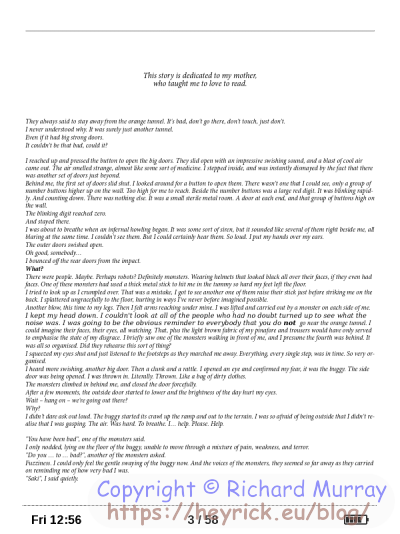 Too small to be readable. That is on a six inch (diagonal) screen. That means it's 91mm × 123mm. Far too small to support text like that. Each line of text was, maybe, six or seven pixels in height. Here's a zoomed up version.
 Anti-aliasing. While that may seem perfectly legible if you move back from your screen (a little less, if your eyes are as crap as mine), on a small eink display of around 600×800 dots and theoretically 16 shades of grey. It is worth noting that the background is sort of silver (not white), the contrast is a lot lower than your screen, and there is always ghosting effects from one page change to another. Which means that what you actually see is more like this.
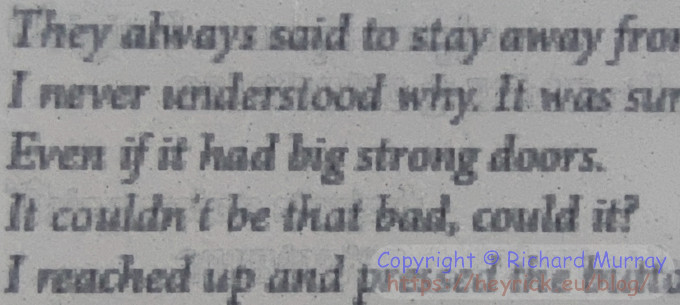 Too hard to read.
Now, I cannot change the technology of eink displays, nor am I going to buy a reader with a larger/better screen. Well, the first step is to identify what's actually going wrong. Lukcily, it's pretty easy to spot. Here's the source of the problem.
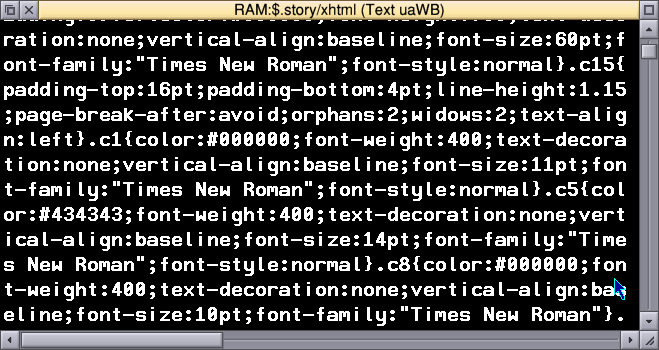 This is hard to read, too!
Look at all those embedded text sizes. 60pt, 16pt, 11pt... Ugh. The reader software (AdobeViewer, I think) is interpreting those and trying to, literally, display that. Because my ereader is a little Linux based computer, it probably thinks the display panel is an actual display.
As such, there is a much better solution that's quite apparent. One that Google ought to have adopted for epub. Instead of writing in absolute text sizes (which, incidentally, defeats the ability to resize the text), simply determine what the body text size is and set everything to be relative to that. The body text is, therefore, "1 em". An em in text sizing means "the default size". For many documents, this is 12 point, and it is what I'm assuming here as I really can't be bothered to try to parse that markup to determine what's the body text. This is supposed to be a quick fix, not a deep dive.
Then, you simply calculate the result of the desired size divided by the default size. For instance, if your title is 24pt, then 24÷12 is 2. So it's 2 em.
I wrote a little BASIC program to whizz through the document looking for colons. If it found a ' Which led to markup that was still bloated and awful, but with sizing that actually worked.
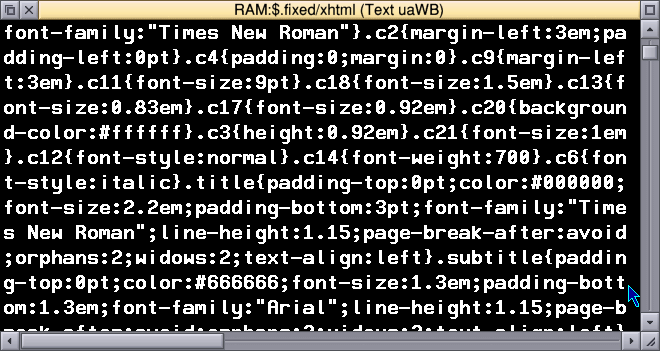 Slightly less naff. Which leads to this appearing on my ereader's screen.
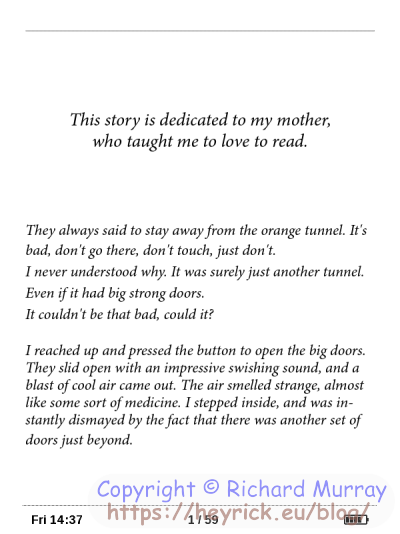 That's better, nicely readable. Better yet, if I'm outside and there's sun and shadows and distractions, a quick pinch out and...
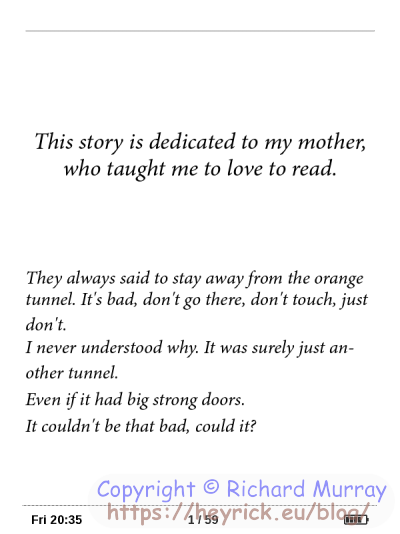 Even more readable.
Some code? Oh, okay then... Sorry, if you're not using RISC OS. It's BBC BASIC as it's just a little something I threw together to deal with this specific use case. There will be better methods and better algorithms. Like I said, this was just thrown together to bash Docs' shonky output into something that worked on my ereader.
REM >GDepubFix
REM Rick's simple epub fixer
REM
REM Because Google Docs *hardwires* absolute
REM text sizes into the document, and that
REM goes REALLY wrong on some *actual* ereaders
REM that try to obey the sizes specified.
REM
REM (C) 2023 Richard Murray
REM http://heyrick.eu/blog/index.php?diary=20230714
REM
REM Licence: "I don't give a ****."
REM If your jurisdiction needs more words, assume CDDL.
REM
REM Input file BASE, treating .epub as an open .zip
base$ = "Belinda7/zip.GoogleDoc."
i% = 0 : REM Input file handle
o% = 0 : REM Output file handle
fl% = 0 : REM Length of input file
REM buff% : REM Block of memory for buffering input
off% = 0 : REM Offset into buffer
b% = 0 : REM Byte read from buffer
nh% = 0 : REM Number-high (tens) read from buffer
nl% = 0 : REM Number-low (ones) read from buffer
REM Copy the original as "OldVers"
OSCLI("Copy "+base$+"Belinda7/xhtml "+base$+"OldVers/xhtml ~CF~P~V")
i% = OPENIN(base$+"OldVers/xhtml")
ON ERROR CLOSE#i% : PRINT REPORT$+" at "+STR$(ERL) : END
REM Then block-load it in
fl% = EXT#i%
DIM buff% fl%
SYS "OS_GBPB", 4, i%, buff%, fl%
CLOSE#i% : REM Done with the input
REM Process the data, writing out as we go
o% = OPENOUT(base$+"Belinda7/xhtml")
ON ERROR CLOSE#o% : PRINT REPORT$+" at "+STR$(ERL) : SYS "Hourglass_Smash" : END
SYS "Hourglass_Start", 1 : REM Immediate start
off% = 0
REPEAT
REM Get a byte
b% = buff%?off%
IF ( b% <> ASC(":") ) THEN
REM It was *NOT* a colon, so just write it out
BPUT#o%, b%
off% += 1
ELSE
REM It was a colon.
REM
REM Is it followed by a number?
nh% = buff%?(off%+1)
IF ( (nh% >= ASC("0")) AND (nh% <= ASC("9")) ) THEN
REM Is *that* followed by a number or by 'p'?
nl% = buff%?(off%+2)
IF ( (nl% >= ASC("0")) AND (nl% <= ASC("9")) ) THEN
REM Here, we have ":##", so we just need to check
REM that it is followed by "pt".
IF ( ( buff%?(off%+3) = ASC("p") ) AND ( buff%?(off%+4) = ASC("t") ) ) THEN
PROCemify(nh%, nl%)
b% = 0
off% += 5
ENDIF
ELSE
REM We have ":#" so was nl% a 'p'?
IF ( nl% = ASC("p") ) THEN
REM Just check the final byte is indeed a 't'
IF ( buff%?(off%+3) = ASC("t") ) THEN
PROCemify(ASC("0"), nh%)
b% = 0
off% += 4
ENDIF
ENDIF
ENDIF : REM Second is a number
ENDIF : REM First is a number
REM If it wasn't a number, just write out whatever it was
IF ( b% <> 0 ) THEN
BPUT#o%, b%
off% += 1
ENDIF
ENDIF : REM It was a colon
UNTIL (off% >= fl%)
CLOSE#o%
SYS "Hourglass_Off"
END
DEFPROCemify(hn%, ln%)
LOCAL size%, scale%
hn% -= ASC("0") : REM ASCII -> number
ln% -= ASC("0")
REM Determine the text size
size% = (hn% * 10) + ln%
REM We're assuming 12pt is the default here
IF (size% = 0) THEN
REM Safety trap for zero values (used in margins)
BPUT#o%, ":0em";
ENDPROC
ENDIF
IF (size% = 12) THEN
REM Assume this is our base size
BPUT#o%, ":1em";
ELSE
REM It needs to be scaled
scale = size% / 12
@% = "+g3.1" : REM format as ##.#
BPUT#o%, ":"+STR$(scale)+"em";
ENDIF
ENDPROC
Your comments:Please note that while I check this page every so often, I am not able to control what users write; therefore I disclaim all liability for unpleasant and/or infringing and/or defamatory material. Undesired content will be removed as soon as it is noticed. By leaving a comment, you agree not to post material that is illegal or in bad taste, and you should be aware that the time and your IP address are both recorded, should it be necessary to find out who you are. Oh, and don't bother trying to inline HTML. I'm not that stupid! ☺ ADDING COMMENTS DOES NOT WORK IF READING TRANSLATED VERSIONS.
|
(Felicity? Marte? Find out!)
📺 The SIBA stories 📹
It's a simple substring match.
Last read at 11:52 on 2024/05/02.


| |||||||||||||||||||||||||||||||
| Next entry - 2023/07/15 Return to top of page |
| © 2023 Rick Murray |
| Retrieved from http://heyrick.eu/blog/index.php?diary=20230714 on 2nd May 2024 |


